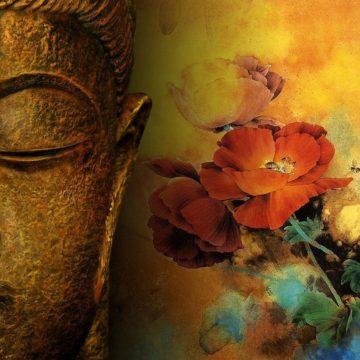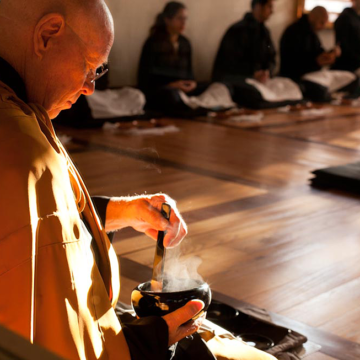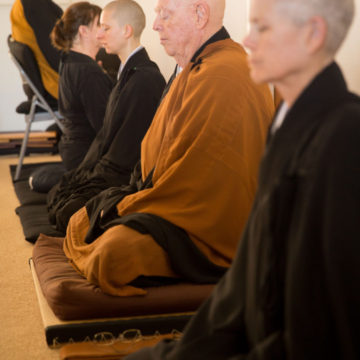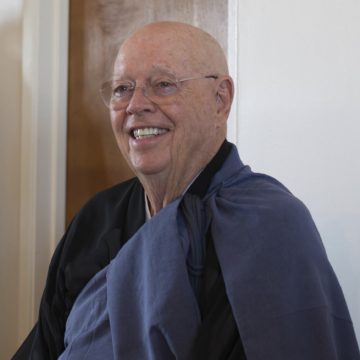Dharma talks that were given by Nyogen Roshi at the Hazy Moon might have been inspired by a koan, a sutra, the writings of our Zen ancestors, modern scientific explorations, a student’s question, or today’s headlines. In every talk, you hear the vitality of the living word, the spontaneous expression of prajna flowing from the awakened mind that cuts through our confusion to encourage and invigorate our practice.
The Three Jewels
Riffing on an exchange between Huike and his disciple Seng-ts’an–the second and third patriarchs of Chinese Zen–Roshi tells us that our own delusional thoughts are like the sin that Seng-ts’an believed was the reason for his suffering. Our thoughts, like Seng-ts’an’s belief in his transgression, are the real cause of our trouble. “You cannot speak ill of yourself and attain the way,” Roshi says. “We take a vow not to speak ill of the three treasures. You’re the three treasures! You are the wonder–if you can wake up.”
Cease and Desist
Bringing up some practice instructions from Dogen Zenji, Nyogen Roshi tells us that the chatter of the unenlightened mind obscures the wonder of the world as it truly is. “Cease and desist,” Roshi says, quoting Dogen, “and you are like an ocean taking in a hundred rivers.”
Experience the Wonder of Your Life
Responding to a talk from a long-time student, Roshi commends the student for seeing how we reinforce our own suffering when we hang on to any kind of negativity. “If you constantly work in negative images,” Roshi says, “that is what you produce.” That fact highlights the key insight of Zen: “How do you begin to […]
It’s Right In Front of You
Recent serious illnesses in the sangha prompt Nyogen Roshi to confront us with a fact that we usually prefer to avoid: The basic ground of the egocentric mind is the fear of death. Zen practice, Roshi then reminds us, offers a way out of that trap–and the way is always right in front of us. “You can begin to experience something quite marvelous,” Roshi concludes.
Continuous Practice
In this excerpt from a wide-ranging talk, Nyogen Roshi emphasizes the importance of continuous practice for the practitioner who aspires to true liberation from suffering. He also cautions us not to see the imperative of “home-leaving” as necessarily involving “shaving our heads and putting on a funny costume.” True home-leaving, he tells us, means freeing ourselves from the “nest” of delusional beliefs, opinions and preferences…
Ordinary Mind is the Way
Ego’s job is to make things seem solid and safe, but ego’s sense is always delusional. When we see that whatever ground we hold onto in our delusional mind keeps us separate, then we can enter into this world of oneness. The world of oneness exists here now. It cannot be reached conceptually…
Bathing the Body of the Buddha
Reflecting on the Hanamatsuri ceremony–when Sangha members offer flowers and bathe the body of a statue representing the newborn Buddha–Nyogen Roshi reminds us that this ritual of purification is simply another reminder that cultivating samadhi is the point of our practice…
The Point of Zazen
Nyogen Roshi reminds us that zazen–Zen meditation–means non-thinking. When we cultivate this non-thinking state, we realize our true nature. “At the heart of the teaching is a practicing Buddha,” Roshi says. “That’s what you are, at the heart.”
The Way Things Truly Are
Responding to those who come to Zen practice to pursue a career as a spiritual teacher, or to have a psychedelic experience, Nyogen Roshi offers a corrective to some common misunderstandings. “The hard work of transcending the egocentric self can only be done through sitting practice, through zazen,” Roshi says. “And there’s only one reason […]
Find Out What You Are
A group of newcomers inspires Nyogen Roshi to deliver a barn-burner of talk on Zen and the core teachings of Buddha-dharma. After touching on the importance of the ritual form of Zen practice, the inevitability of suffering in the realm of Samsara and the peace that comes from the cultivation of Samadhi, Roshi concludes by […]
Seeing Beyond
What does it mean to work on a koan? “You’re trying to free yourself from the limitations of your egocentric intellect,” Nyogen Roshi tells us in this excerpt from a recent talk. Seeing beyond these limitations requires focus and determination, but the reward is nothing less than liberation from delusion. “You have to kick out […]
No Self Deception
The last line of the “Gatha on Opening the Sutra,” a verse that we all chant before Roshi or anyone else gives a talk, says, “May we completely realize the Tatagatha’s [the Buddha’s] true meaning.” We have included the chanting of the gatha in this excerpt from the beginning of a recent talk because Roshi […]











